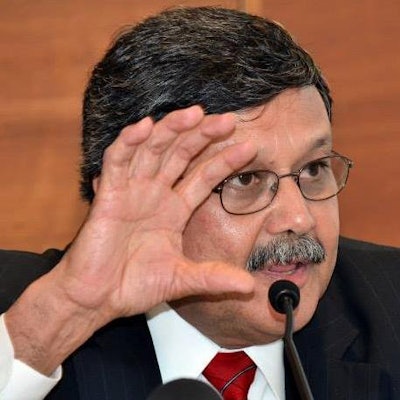As the dean of student affairs of the Journalism School at Columbia University, Ernest Sotomayor brings years of professional experience to mentoring the next generation of journalists and helping them adapt to life in New York City. This is no easy task, considering the diverse backgrounds students come from.
 Ernest Sotomayor
Ernest Sotomayor“From almost the very first hour they’ll be out on the street, looking for stories,” says Sotomayor. “We teach reporting, reporting, reporting.”
Like the journalism school’s curriculum, Sotomayor built his career around strong reporting, with an emphasis on breaking news. He started as a journalist at the University of Arizona, writing for the campus newspaper, The Daily Wildcat. He even left college early to start a job as a general assignment reporter for the El Paso Herald Post in Texas. He later returned to the University of Arizona to finish the two classes he had not completed.
From El Paso, he moved on to the Dallas Times Herald, where he reported on award-winning stories about immigration. He later worked as a reporter and editor at Newsday, covering Queens and Brooklyn for 17 years. His contributions to breaking news coverage of a subway crash in 1991 and the crash of TWA Flight 800 off the coast of Long Island helped his teams win Pulitzer Prizes.
During his time at the Times Herald and Newsday, Sotomayor did recruitment work, reaching out to prospective reporters and interns of color. He also worked with organizations like the National Association of Hispanic Journalists, where he served as vice president. This exposure to young journalists facilitated the transition into his work at Columbia University.
“It sort of fell very neatly into my lap,” he says.
He started at the journalism school in 2005 and created the Career Services Center that helps graduates and alumni find work in the field.
“We don’t hand anyone a job,” says Sotomayor. “We don’t place anyone here. We try to make them the strongest candidate.”
He still oversees career services, but his responsibilities expanded when he became dean of student affairs. He summarizes his job as “keeping students enrolled and keeping them healthy.”
Sotomayor’s job description has also gone beyond New York City in recent years as the journalism school has begun to collaborate with universities in Latin America. Sotomayor has taught master classes and seminars in investigative journalism at universities in Bolivia and Brazil.
Despite this changing landscape of his work and the journalism profession as a whole, Sotomayor emphasizes the foundations.
“We teach the same journalism we did 100 years ago,” he says. “It’s all about reporting. Getting the bricks you need to build your story.”
Joseph Hong can be reached at [email protected]















